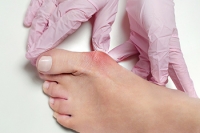 Human papillomavirus (HPV) is often the cause of a painful condition known as plantar warts. These warts can develop on the bottom of the feet and grow inward due to the amount of pressure that the feet endure while walking and standing. Plantar warts are small, grainy growths that may have tiny black dots in the center. These are blood vessels that have broken and sometimes cause pain and discomfort. Plantar warts can develop from frequenting areas like public swimming pools and locker rooms, where fungi thrive. These warts are contagious, so it is suggested that you refrain from sharing shoes, socks, and towels with others. If you have pain on the bottom of your foot or notice hardened areas that may be plantar warts, it is strongly suggested that you consult with a podiatrist who can help find the right course of treatment for you.
Human papillomavirus (HPV) is often the cause of a painful condition known as plantar warts. These warts can develop on the bottom of the feet and grow inward due to the amount of pressure that the feet endure while walking and standing. Plantar warts are small, grainy growths that may have tiny black dots in the center. These are blood vessels that have broken and sometimes cause pain and discomfort. Plantar warts can develop from frequenting areas like public swimming pools and locker rooms, where fungi thrive. These warts are contagious, so it is suggested that you refrain from sharing shoes, socks, and towels with others. If you have pain on the bottom of your foot or notice hardened areas that may be plantar warts, it is strongly suggested that you consult with a podiatrist who can help find the right course of treatment for you.
Plantar warts can be very uncomfortable. If you need your feet checked, contact Brent Harwood, DPM from Southeast Podiatry. Our doctor will assist you with all of your foot care needs.
About Plantar Warts
Plantar warts are the result of HPV, or human papillomavirus, getting into open wounds on the feet. They are mostly found on the heels or balls of the feet.
While plantar warts are generally harmless, those experiencing excessive pain or those suffering from diabetes or a compromised immune system require immediate medical care. Plantar warts are easily diagnosed, usually through scraping off a bit of rough skin or by getting a biopsy.
Symptoms
- Lesions on the bottom of your feet, usually rough and grainy
- Hard or thick callused spots
- Wart seeds, which are small clotted blood vessels that look like little black spots
- Pain, discomfort, or tenderness of your feet when walking or standing
Treatment
- Freezing
- Electric tool removal
- Laser Treatment
- Topical Creams (prescription only)
- Over-the-counter medications
To help prevent developing plantar warts, avoid walking barefoot over abrasive surfaces that can cause cuts or wounds for HPV to get into. Avoiding direct contact with other warts, as well as not picking or rubbing existing warts, can help prevent the further spread of plantar warts. However, if you think you have developed plantar warts, speak to your podiatrist. He or she can diagnose the warts on your feet and recommend the appropriate treatment options.
If you have any questions please feel free to contact one of our offices located in Fairhope, Brewton, and Atmore, AL . We offer the newest diagnostic and treatment technologies for all your foot care needs.
Read more about Plantar Warts







